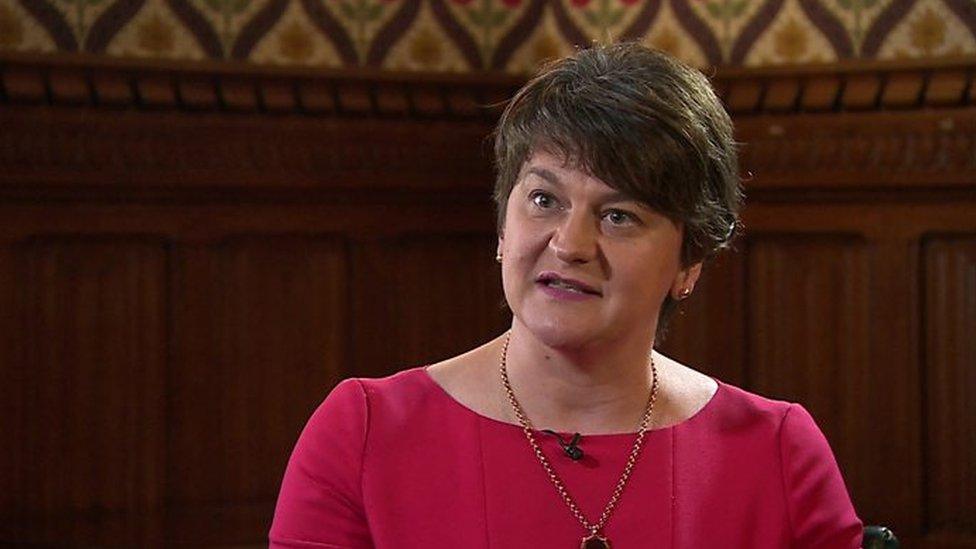DUP leader Foster issues Brussels Brexit warning
- Published
- comments
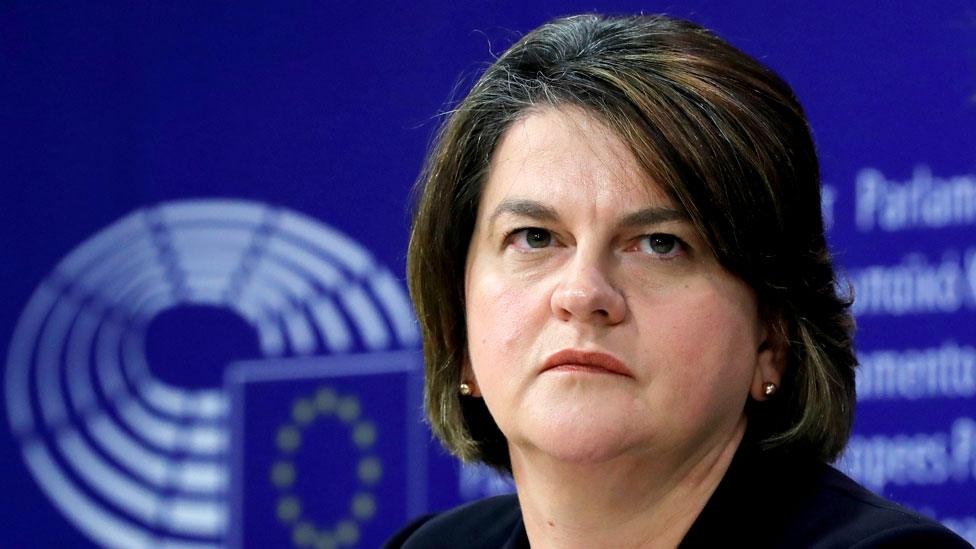
Arlene Foster was speaking after talks with Michel Barnier in Brussels
The DUP leader has warned she will not support any Brexit deal that could lead to new economic barriers between Northern Ireland and the rest of the UK.
Arlene Foster was speaking after a meeting with the EU's chief Brexit negotiator Michel Barnier in Brussels.
The government is expected to give details of its backstop plan in the coming days.
Mrs Foster said it would be studied carefully.
"What we need to see is the legal text," she said.
"We cannot talk in a vacuum. We need to see what has been proposed and we will check that against what we have called our red line."
Mrs Foster said she hadn't been shown a text of a "hybrid backstop" plan being worked up by UK officials.
Diplomatic sources have suggested to the BBC that it is unlikely the UK would present a document outlining an alternative to the backstop in the withdrawal agreement.
"Instead the negotiations are about where the two sides converge," said the BBC's Brussels reporter Adam Fleming.
"Talks this week are intense and fluid but there is said to be a sense of optimism and movement."
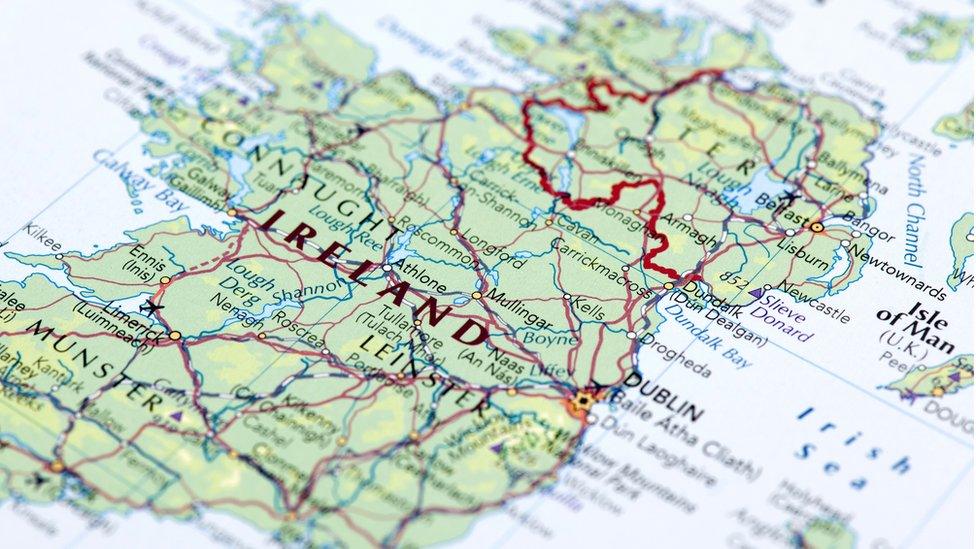
The Irish border is a major issue in Brexit negotiations
Ireland's foreign minister says that efforts to reach a deal on the withdrawal agreement will probably have to continue into November.
Simon Coveney says he expects the UK to bring forward new text on the border backstop, though he does not expect it to be published, instead confined to negotiations.
Mr Coveney said he hoped a new text would be "helpful" but does not know if it would be enough for a significant step forward by next week's EU summit.
He said he would know more after meeting the EU's chief Brexit negotiator on Monday and Tuesday.
'Catastrophic'
The backstop arrangement is effectively an insurance policy to avoid a hard border in Northern Ireland.
It is what will happen if a deal is agreed but the border cannot be kept as frictionless as it is now.
The EU believes the backstop should mean Northern Ireland effectively staying in the single market for goods and the customs union until the UK comes up with a solution to the border issue.
Prime Minister Theresa May wants a backstop that would see the whole of the UK staying in the customs union for a limited period of time after the transition period - something the EU has said is unacceptable.
Mrs Foster has warned there will be "catastrophic" consequences for the Northern Irish economy if any trade barriers are introduced between Northern Ireland and Great Britain.

Analysis: BBC News NI's Gareth Gordon in Brussels
The large number of journalists waiting to hear Arlene Foster's take on her meeting with Michel Barnier tells you everything about the DUP's meteoric rise up the political pecking order.
Small regional parties do not normally attract the attention of the international media.
However, the DUP is the party which Theresa May relies on to stay in power, and the party can - theoretically at least - vote down a backstop deal.
There was general astonishment in the media centre when Mrs Foster said she hadn't yet seen the UK's so-called hybrid backstop plan.
If it does contain provision for light-touch regulatory checks on goods between Northern Ireland and Great Britain, she left no doubt that would be unacceptable to the DUP.
Mrs Foster added that she would wait to see the text before commenting in detail on the issue.
When she does, the DUP might have a tough decision to make, and so might the Prime Minister.

Representatives of Northern Ireland's two main unionist parties - the DUP and the Ulster Unionists - met Mr Barnier earlier on Tuesday to discuss Brexit.
Ulster Unionist leader Robin Swann was guardedly optimistic about the possibility of "a good deal for the UK which involves NI and the EU".
"The feeling we're getting coming from the negotiators, the ambassadors and from part of the negotiating team that we met seem to be indicating we are going towards a deal," he said following his party's talks with Mr Barnier.
"We are seven to ten days from this deal having to be on the table.
"I don't want to be overly optimistic or to spook the horses but I think serious negotiations are going on."
Allow X content?
This article contains content provided by X. We ask for your permission before anything is loaded, as they may be using cookies and other technologies. You may want to read X’s cookie policy, external and privacy policy, external before accepting. To view this content choose ‘accept and continue’.

Mr Barnier recently called for "less drama" over the so-called Brexit backstop regarding the Irish border.
The EU negotiator held talks with four of NI's other parties last Friday.
'Catastrophic' warning
Mrs Foster had earlier warned that the party would not support a Brexit deal that could lead to any new checks on goods coming into NI from elsewhere in the UK.
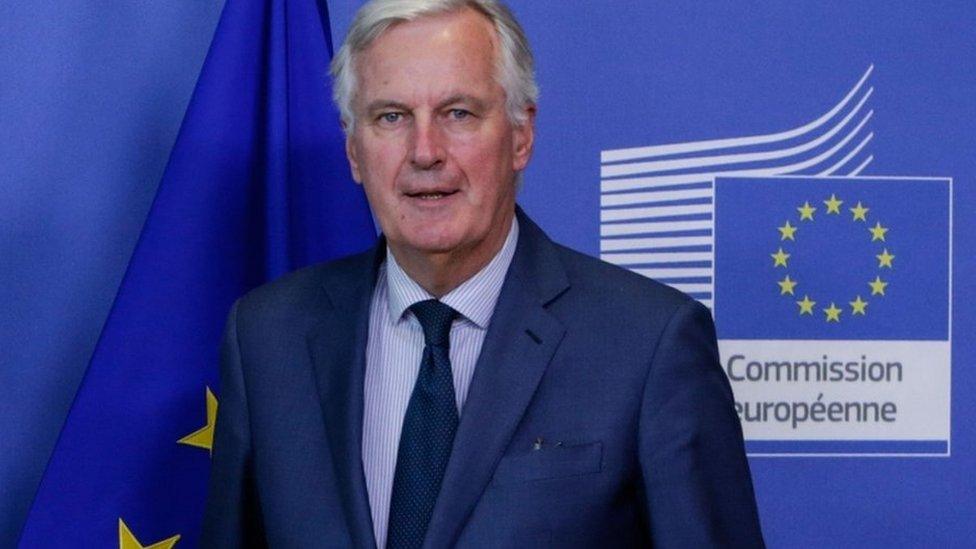
Michel Barnier is the EU's chief Brexit negotiator
Speaking ahead of Tuesday's meeting, she said: "The United Kingdom single market must be protected with no new borders between Northern Ireland and Great Britain being created. From day one this has been the DUP's only red line.
"Over 70% of all goods leaving Belfast port are destined for Great Britain. To create a barrier to that trade would be catastrophic."
Allow X content?
This article contains content provided by X. We ask for your permission before anything is loaded, as they may be using cookies and other technologies. You may want to read X’s cookie policy, external and privacy policy, external before accepting. To view this content choose ‘accept and continue’.

Following their meeting with Mr Barnier last week, Sinn Féin and the SDLP said they rejected the possibility of Stormont having a say over what kind of backstop may emerge.
Proposals being worked on by the British government are said to include some kind of role for MLAs, but the nationalist parties are fearful that this would give rise to a veto for the DUP.
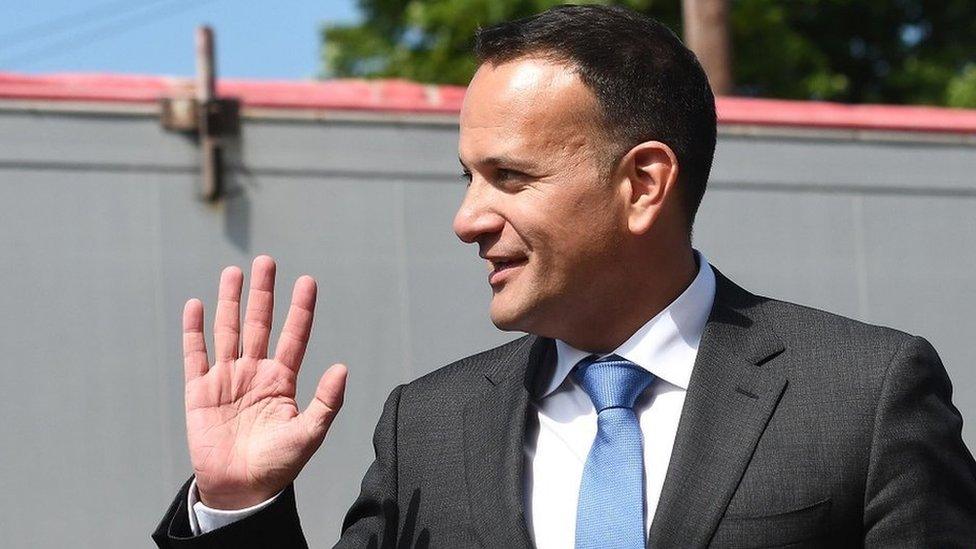
Taoiseach Leo Varadkar wants a Brexit withdrawal agreement by November
On Saturday, EU officials expressed optimism that a Brexit deal could be struck by the end of the year.
But Irish taoiseach (prime minister) Leo Varadkar said there was still "a fair bit of work to be done".
NI secretary Karen Bradley told the Conservative Party conference the government would "never ever allow a border down the Irish Sea".
Meanwhile, Irish finance minister Paschal Donohoe has said that the Irish government's "central case" is that a Brexit deal will be done in the coming weeks between Britain and the European Union.
But the Republic of Ireland is continuing to plan for the possibility that no deal is agreed.
Speaking as he set out Ireland's 2019 budget in parliament, he said spending plans were "based on a central case that there will be agreement in the coming weeks".
"However, the possibility of a no-deal Brexit has influenced decisions," he added.
The UK is due to leave the EU on 29 March 2019.
- Published7 June 2018
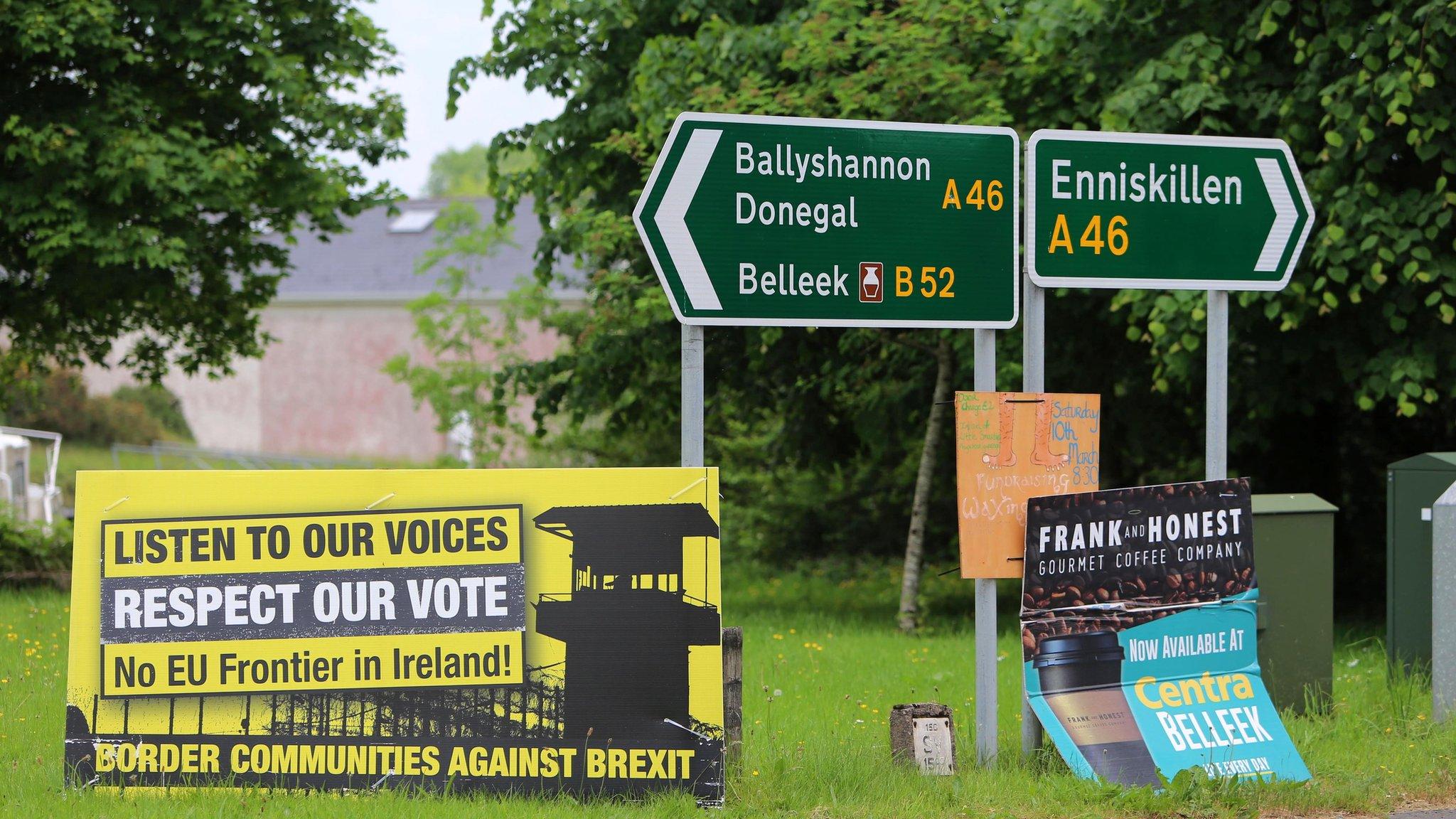
- Published29 March 2018
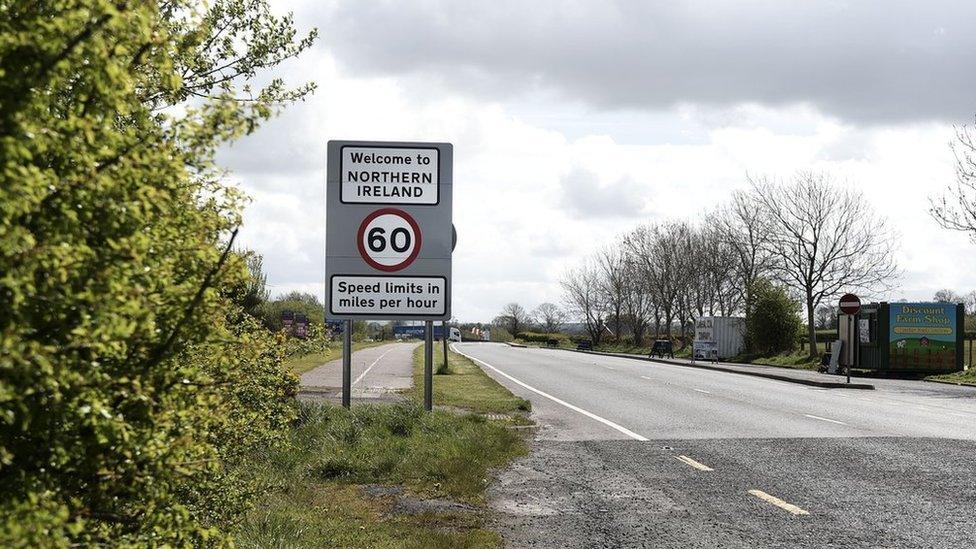
- Published5 October 2018
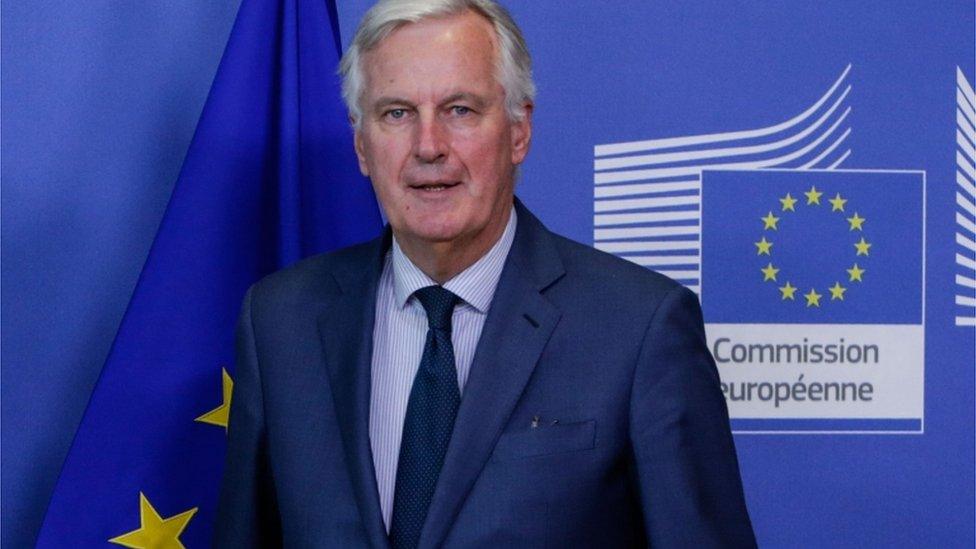
- Published2 October 2018
